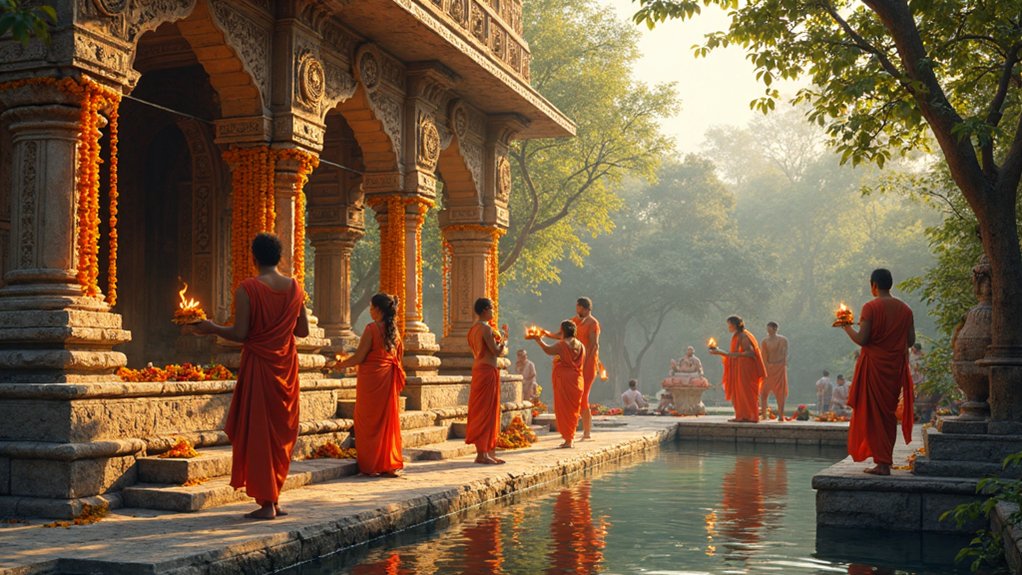
Did you know how old is Hinduism?
Fascinating insights into the age of Hinduism reveal its profound depth; discover the surprising truths that redefine this ancient faith's significance.

Hinduism is a fascinating and diverse religion that offers a unique perspective on spirituality and life’s meaning. At the heart of Hinduism are core beliefs such as Dharma and Karma, which guide followers in making ethical choices and understanding the results of their actions. Hinduism also encourages the pursuit of Moksha, or spiritual liberation, and the worship of many deities, each representing different aspects of the divine.

By learning about Hinduism, you can gain valuable insights into your own spiritual journey and discover how its core beliefs can help shape your life’s purpose. Whether you are new to Hinduism or looking to deepen your understanding, exploring its teachings can be a rewarding and enlightening experience.
Hinduism is one of the world’s oldest religions, known for its fascinating and complex traditions.
Hinduism features a diverse array of deities, rituals, and philosophies that deeply influence daily life. A key aspect of Hinduism is its focus on spirituality and personal experience, encouraging followers to explore and connect with the divine in their own unique ways.
Whether you’re interested in ancient teachings, colorful festivals, or spiritual practices, Hinduism offers a rich cultural and spiritual journey for people around the world.
Dharma is a key concept in Hindu philosophy, representing the moral and ethical duties that shape how people live their lives.
Understanding dharma means recognizing the importance of acting responsibly, whether you’re a student, a parent, or a professional. By following your dharma, you help create harmony and balance in your community.
Embracing dharma encourages you to make choices that align with universal values and support the greater good. When you live according to dharma, you not only fulfill your personal responsibilities but also contribute to a more just and peaceful world.
As you explore the concept of karma and reincarnation, you’ll discover how these powerful forces shape your spiritual journey.
Karma and reincarnation are deeply connected—your actions, whether positive or negative, create karma that influences your future experiences.
Through reincarnation, your soul has the opportunity to return to new lives, learning valuable lessons and growing with each lifetime.
By understanding karma and reincarnation, you can make more mindful choices and navigate life’s challenges with greater awareness.
Embracing the principles of karma and reincarnation can lead to personal growth and a deeper sense of purpose.
ursuit of Moksha
The pursuit of moksha is considered the ultimate goal in Hinduism. Moksha, or liberation, is the process of freeing yourself from the endless cycle of birth and rebirth.
By focusing on the pursuit of moksha, you strive to let go of worldly attachments and desires. Achieving moksha means reaching a state of true freedom, where you experience unity with the divine and enjoy everlasting peace and fulfillment.
The pursuit of moksha offers a way to transcend the limitations of physical existence and discover a deeper, spiritual purpose in life.
In Hinduism, the role of deities and worship holds great importance, shaping the way followers experience spirituality and connect with the divine.
The role of deities and worship is seen in daily rituals, prayers, and offerings to various gods and goddesses—each symbolizing unique aspects of life and the universe.
By embracing the role of deities and worship, individuals build personal relationships with the divine, strengthening their devotion and guiding their beliefs.
This connection not only deepens spiritual understanding but also helps people find meaning and purpose within the wider cosmos.
Rituals and festivals in Hinduism hold great significance, shaping both spiritual and community life.
Participating in Hindu rituals and festivals, such as Diwali and Holi, helps individuals celebrate deities and honor important traditions.
These Hindu rituals and festivals foster a sense of unity, strengthen cultural values, and create lasting memories.
Scriptures are incredibly important in Hinduism, providing the foundation for beliefs, daily practices, and moral guidance.
By reading scriptures such as the Vedas, Upanishads, and the Bhagavad Gita, you gain valuable insights into life, ethics, and spirituality.
Studying these scriptures not only helps you understand the universe and your role within it, but also guides you toward harmony and enlightenment.
Exploring Hindu scriptures is essential for anyone seeking deeper meaning and spiritual growth.
The philosophy of yoga offers a deep and meaningful way to understand yourself and the world around you.
Rooted in ancient traditions, the philosophy of yoga emphasizes practices such as meditation, breathwork, and physical postures to help you achieve greater self-awareness and inner peace.
By embracing the philosophy of yoga, you can nurture balance in both body and mind, connect with your true self, and embark on a journey towards spiritual growth and enlightenment.
Whether you’re new to the philosophy of yoga or looking to deepen your practice, its timeless wisdom provides valuable guidance for modern life.
Exploring the diversity of beliefs and practices in Hinduism reveals a fascinating and intricate tradition.
The diversity of beliefs and practices in Hinduism is evident in the countless deities worshipped, unique regional rituals, and the many philosophies that shape daily life.
Across India and beyond, the diversity of beliefs and practices in Hinduism allows each community to celebrate its own festivals and follow distinct spiritual paths, all while honoring shared core principles.
This diversity not only enriches Hinduism but also demonstrates its adaptability and enduring appeal across generations.
To sum up, Hinduism is a vibrant and ancient tradition that offers a wealth of wisdom for anyone seeking spiritual growth. By learning about Hinduism, you can discover core principles like Dharma, Karma, and Moksha, which help you understand your place in the world and guide your actions. Hinduism encourages you to connect with the divine through worship, rituals, and meditation, deepening your personal relationship with its many deities.
Exploring the diverse philosophies within Hinduism can inspire greater self-awareness, unity, and spiritual fulfillment, making it a meaningful path for those interested in personal and spiritual development.

Fascinating insights into the age of Hinduism reveal its profound depth; discover the surprising truths that redefine this ancient faith's significance.

The origins of Hindu beliefs are complex and multifaceted; discover how influential figures like Vyasa and Patanjali shaped this rich tradition.